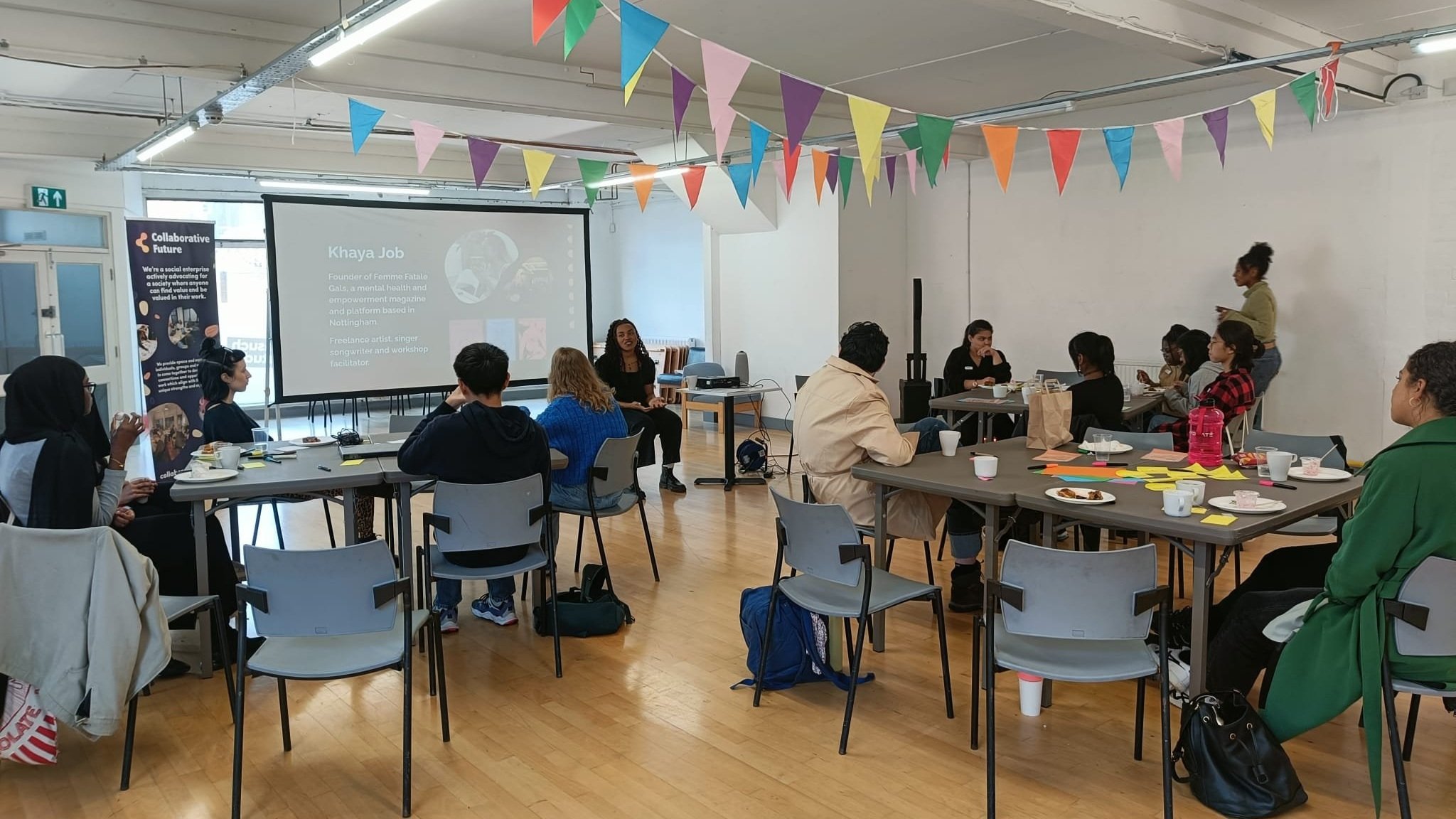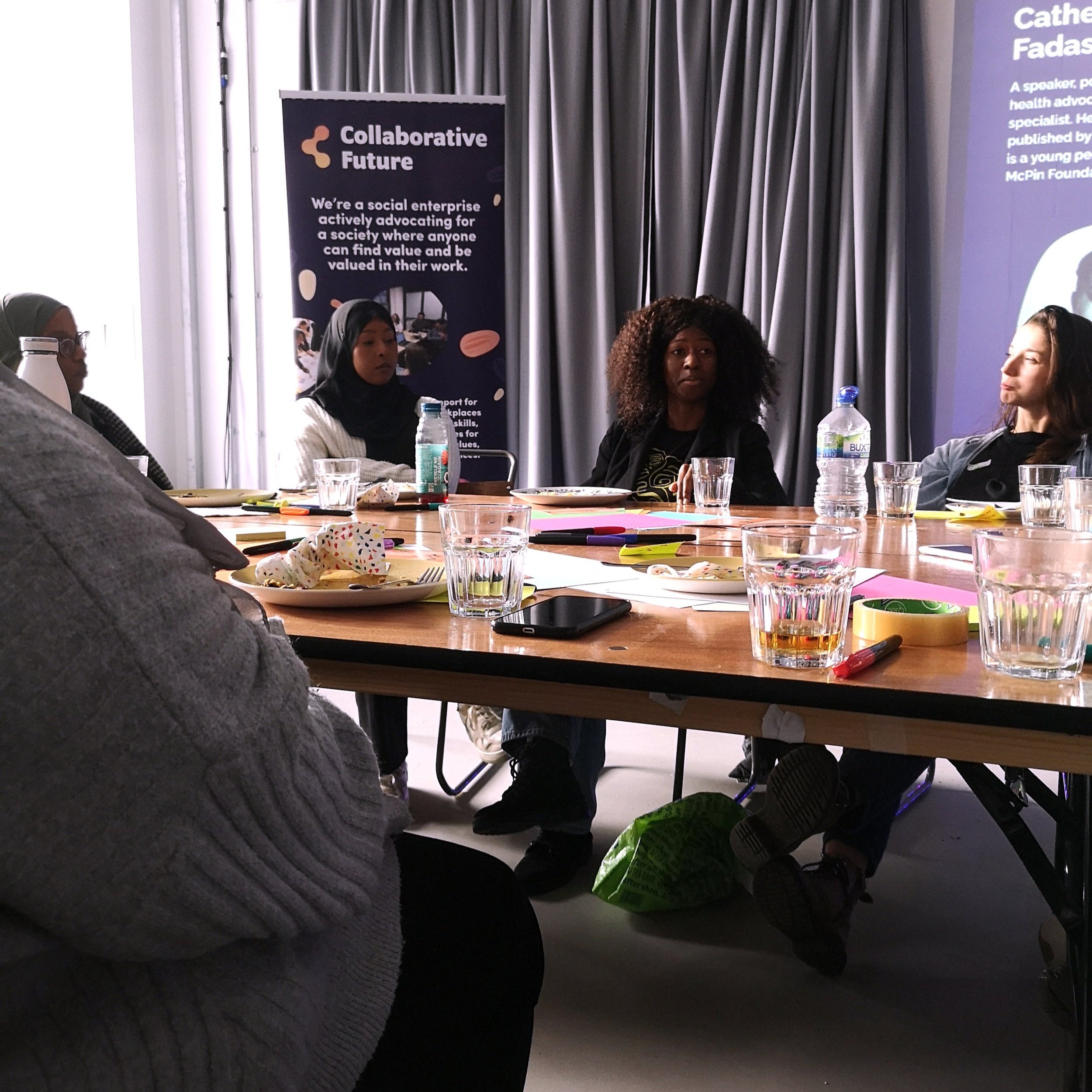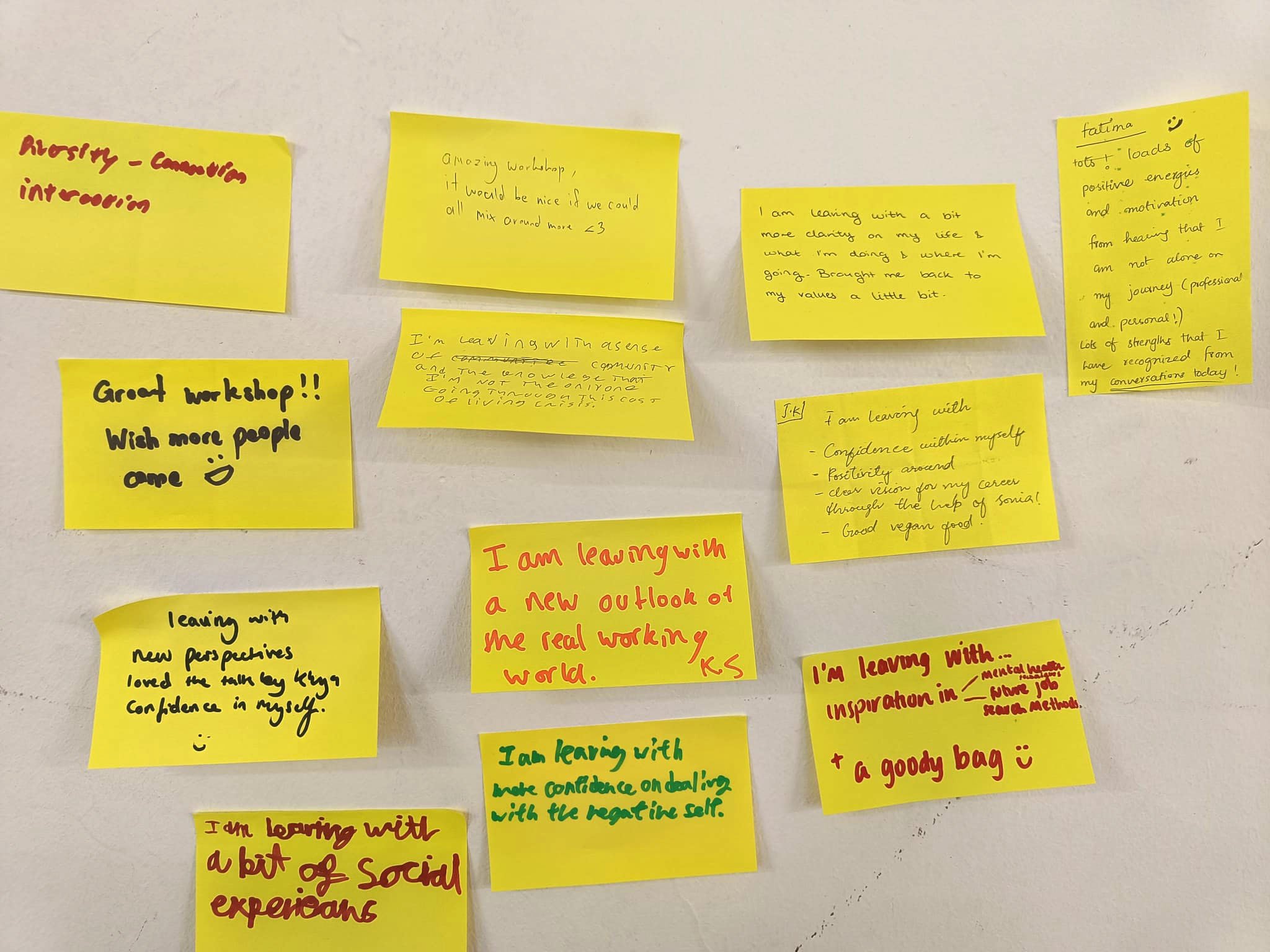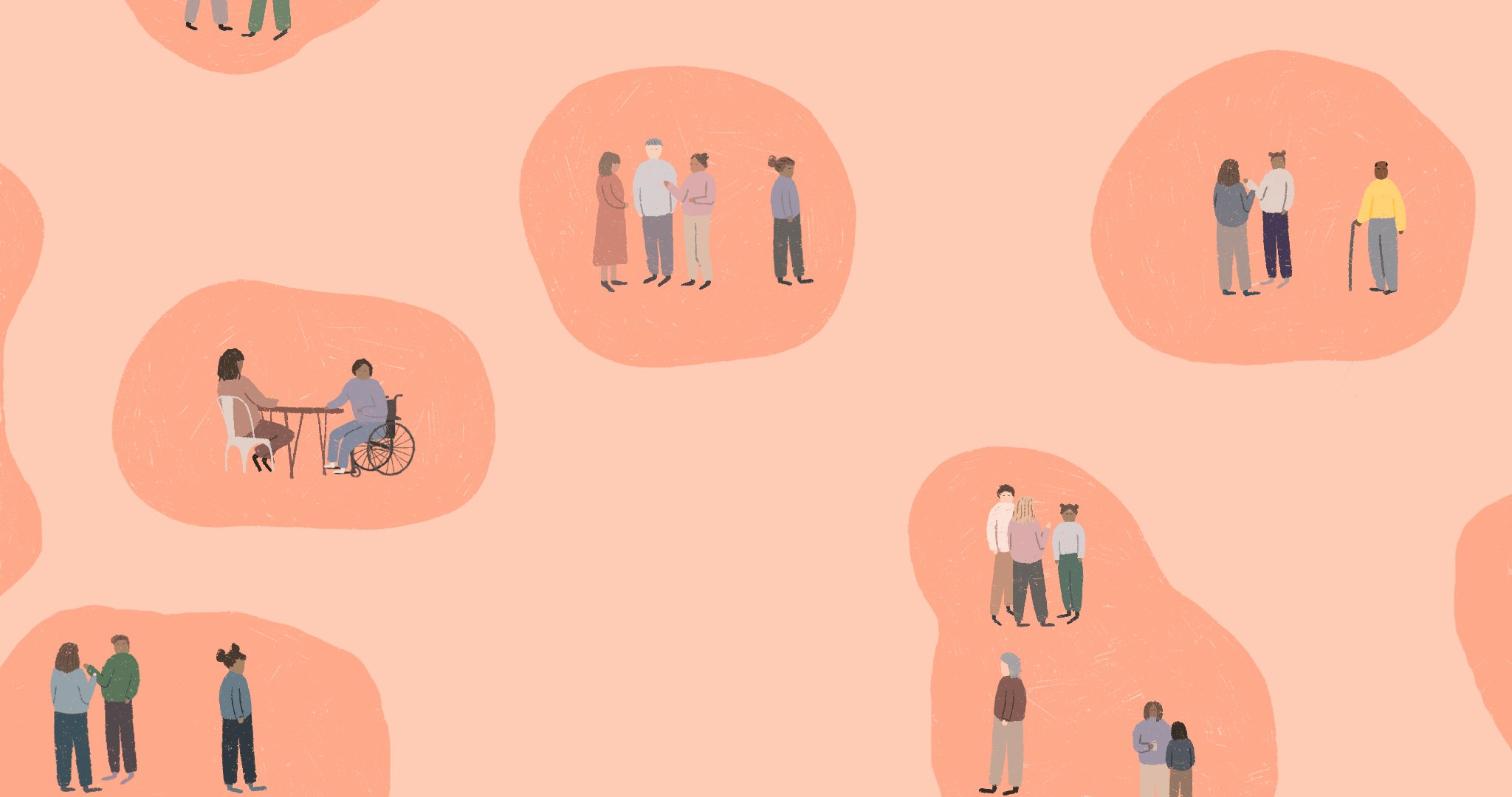Employment experiences of young people in present day
This blog turn report outlines our collective experiences and ideas as young people navigating the world of work - employment, underemployment, self-employment and unemployment - through our recent in person events.
ALT TEXT : A group of young people in an open space sat split between tables, all looking at the speaker sat in front of them.
Having ran a series of talent programmes for young people - last one finishing spring 2022 - this year our team had a chance to regroup, assess our impact, and with the support of National Lottery Community Fund, start to explore other ways Collaborative Future can support and set up environments where everyone feels welcome and part of a community.
As young people ourselves, we specifically wanted to create spaces to bring other young people together to share both common and unique experiences of unemployment, under-employment and their impact while also giving others the support to better understand their skills and strengths.
With these intentions, we ran two events on 15th October in Nottingham at Nonsuch Studios, and on 26th November in London at Hackney Showroom. We were joined by a very diverse group of 20 young people who brought lots of energy to connect, share and build community with us and each other.
Other networks and organisations wishing to connect with young people from the below demographics often ask “How do you manage to attract such a range of perspectives?”. We’d like to highlight that Collaborative Future is run by those it supports - each of our team has lived experience of navigating workplaces and being locked out of opportunities or support due to our gender, sexuality, race, ethnicity and disability. We bring our perspectives and experiences into how we organise, promote and run our events, ensuring we create spaces which people not only find valuable, but also where they feel valued.
Of the young people signing up to our events:
39% were Asian or Asian British
30% were Black African, Black Caribbean or Black British,
22% were White or White British
9% were of mixed or multiple ethnicities
However, diversity of attendees spanned across multiple other characteristics also such as sexuality, disability, religion, gender and nationality. We also collected information about the current situation of the young people we connected with and found that:
45% of them were employed and underemployed - either full time, part time or on a zero hour contract
27% were students or recent graduates
14% were freelance
14% were unemployed
This mix of experiences made for engaging, nuanced and profound conversations.
Exploring experiences
We started the events by holding conversations about our experiences of work, jobhunting and the effects these can have on our sense of belonging and connection with others.
We asked the groups:
“How supported have you felt in finding employment, if at all, since March 2020?”
Guided by this prompt question, we talked about the different ways we have received meaningful support and the ways we have felt let down by the structures posing barriers to youth employment.
One of the main takeaways from this conversation was encapsulated by some of our attendees:
“The problem with each channel for support is they don’t give you the whole picture - they don’t see the whole system.”
“If you only get info from one channel you get a warped perspective”
With a scoring system of -5 to +5, 42% of attendees rated the support they received a 0 or 1, sharing that there was support coming from different sources but that this only covered some parts of the help needed. For example, family and friends were mentioned by most attendees, but this consisted of mostly emotional support.
“Family is supportive in the way that they tell me to follow my passions - but there’s only so much they can help with.”
37% of attendees scored their level and quality of support -1 or less, emphasising the lack of understanding shown by family because of how different employment and jobhunting are now compared to a few decades ago. Another factor mentioned is that the support received, even when professional, was not specific or tailored to them and therefore not useful.
“My parents are older and they don’t understand that the landscape has changed - you can’t just walk into a shop and ask for a job anymore.”
“College careers advisor gave me no advice, just said that I’m doing well”
Lastly, 21% of the young people at our events gave a score of 2 or higher for this question and particularly focused on how helpful emotional and psychological support were to them, professional or otherwise, even if they did not directly lead to a new role or job.
“I got an employment advisor as part of my therapy which was really helpful - they asked “do you even want to do this job” and helped with the depression coming from unemployment.”
“Family helped me build confidence, trusting myself to get things right”
We then asked:
“How suited have you felt to the employment opportunities you have had, if any, since March 2020?”
We talked about negative experiences in the groups and 26% of the attendees who rated their experiences -1 or less revealed that many jobs they had did not allow them to fulfil their potential and, on the contrary, affected their overall wellbeing.
“My current work is not stimulating at all”
“Doing the same thing over and over, working in retail, took an emotional toll as it was very repetitive.”
Another 32% of the group voted 0 or 1, explaining they valued different aspects of their roles and that the balance of these meant they held onto them, even if only in the short-term.
“[The] majority of jobs [I’ve had] I’ve enjoyed even if I haven’t wanted to do them long term. I enjoy the social aspect of working but consistently felt that where I work is not as fulfilling as I’d like it to be because I’m not utilising all my skills.”
Some of the attendees shared that after university they saw gaining experience as essential to move ahead and so they pursued roles that would be suited to them - even if these were underpaid or unpaid.
However, the majority of the young people we spoke with (42%) rated the suitability of their work 2 or more and explored how a meaningful factor to this was finding their roles through their passions and groups they participated in as well as choosing roles that fit in with their needs.
“I found a job relevant to my studies via youth group.”
“I fell into self-employment doing artwork, then got a regular gig doing creative workshops at a community garden. This is something I wouldn’t be able to search for.”
“[I, as an autistic person,] find socialising difficult so it limits what I can do work wise - gardening gives me time alone.”
We delved more deeply into the topic of health, employment and their cyclical relationship by asking:
“Do you think there is a connection between feelings of loneliness and isolation and being unemployed or under-employed for young people?” in Nottingham and ”Has being unemployed or underemployed affected you or others you know emotionally and/or psychologically?” in London.
The overwhelming response to both questions was yes. Still, there was an incredible amount of nuance and empathy shown by the groups which made the conversation valuable and insightful.
Some answers focussed on the importance of joining welcoming teams and cultivating relationships and how a lack of effort, resources or time to do this can cause people to feel isolated.
“Feeling of loneliness as a self-employed artist. You have friendship level connections but really have to make an effort to make those last. You’re going as your own team. Relationships end with the work that moves on. “
“There is loneliness with employment too - doing not what I want to do, working in a team that I can’t relate to. Being a student and new to the team, with others having been there for years and with families.”
Others emphasised how mistreatment from team members and customers as well as practices which do not acknowledge workers as full human beings do not end with the end of the working day, and they influence other areas of one’s life as a result.
“There was harassment from colleagues, people being rude for no reason. It affected my mental health which affected my physical health.”
“I would take work home a lot, these are real people being affected in my work […] There’s no support for yourself - no counselling.”
We also explored how external factors in your life can add pressure to jobhunting and job performance - especially with a cost-of-living crisis and impending recession making all prices unaffordable for many.
We are privately renting. My dad pulled me aside asking how my work is going, saying that we need to tell landlords if we need to move in January.”
These take away choice from many people who are then forced to stay in roles they are not suited to.
“Is this something I want to do or do I want to make a living”
“I was desperate to make a living.“
Through these difficult conversations, we did not forget to make space for self-compassion and the opportunities that can come from employment - chances to create relationships, feel fulfilled and proud of oneself.
“Employment gives you a space for connection.”
“You can be on the right lane but not all the time.”
“The people around me - different ages and backgrounds - I get to see them every single day, spending lots of time with them outside of work which is wholesome”
Inspiring voices and discovering skills
Centring these positive feelings of self-empowerment, we brought in some speakers who explained their journey and their motivations to the groups.
Khaya Job, creator of Femme Fatale Gals, artist and workshop facilitator, spent some time with us in Nottingham to talk about her experiences of work - dealing with mental health issues and how this impacted her journey through school and work. Khaya said:
"I made a career out of the things that used to hold me back"
Her experiences resonated greatly with the attendees who asked further questions and either saw their own experiences reflected in Khaya’s or were inspired by her courage.
In London, we had the opportunity to hear from a panel of talented young entrepreneurs. Rianna Patterson, founder of the youth-led charity Dominica Dementia Foundation, Catherine Fadashe, mental health advocate, poet and marketing specialist and our very own co-founder Tessa Cooper. They talked about the lessons they learnt along the way and the boundaries they have learnt to enforce for their own wellbeing. Meaningful comments made by the speakers included advice for other young people exploring employment:
"I value my time more.. It's an act of self-love and an art as well." Rianna Patterson
"Don't rush growth." Catherine Fadashe
"Don't waste too much time and energy on people that don't understand you." Tessa Cooper
ALT TEXT : A light blue piece of paper with notes on it, with people in the background slightly blurred.
ALT TEXT : A person wearing a hijab sat at a table making notes on colourful paper.
ALT TEXT : A group of people sat at a table writing notes on colourful paper with other people in the background moving around, eating and chatting.
For the last part of the day, we used the skills discovery workshop designed by our Co-Founder Prisca to help the group see the strengths in themselves that they do not normally notice. Sharing them out loud with others in a positive and encouraging environment triggered changes in mindsets and resurgence of motivation.
"I came in thinking I had no skills or fake skills but now I found a way to discover my strengths”
[I am leaving with] “Lots of strengths that I have recognised from my conversations today!”
“The skills discovery exercise at the end was really fun too!”
Reaching our aims and recognising our impact
ALT TEXT : Seven rectangular sticky notes with hand written feedback from the event.
ALT TEXT : Twelve rectangular sticky notes with hand written feedback from the event.
We were extremely pleased with the feedback we received - both in person at the events themselves and from later engagement. Our attendees as well as our speakers and the venues that hosted us shared their positive experience of connecting with us, giving us further drive to continue our work.
“It was lovely connecting with my peers and having that sense of community as well as speaking to the panellists and the organisers of the event.”
“I am leaving with more confidence on dealing with the negative self”
“Thank you for being an empathic considerate bunch.”
“I am leaving with the knowledge and reassurance on how to better navigate myself in the world of work.”
“I felt very welcomed in the space. You, Sonia and Tessa are building something very purposeful.”
“I am leaving with a sense of community and the knowledge that I’m not the only one going through this cost-of-living crisis.”
“I am leaving with lots of positive energies and motivation from hearing that I am not alone on my journey (professional and personal!)
We want to thank our sponsors who have made these events as warm and welcoming as they were - Tony’s Chocolonely which has provided chocolate bars to be put in goodybags for each attendee and Letts of London which has given us notebooks we have distributed as a prize for completing a feedback form.
We had an amazing time meeting other young people, inspiring them but being equally as inspired by them to continue creating spaces to speak about employment and the nuanced ways that we can improve our lives through listening and championing each other. We also learnt much about how to best create spaces that are inviting and welcoming for young people from all backgrounds and are keen to share this knowledge with other organisations who want to engage more young people in an equal and meaningful way.
Get in touch if you want to talk about collaborating on events, mentoring or work placement programmes. In the coming year, we will be offering the strengths discovery workshop again as a Mighty Employer within the Mighty Creatives network, supporting more young people to see themselves as the capable and talented people they are. We will also be using the findings from these conversations in future proposals for events such as the UK Creative Festival, and funding applications focusing on young people such as the Co-op Communities Fund.
Ways to support us + work with us:
Buy us a ko-fi
A small way to say thank you for sharing our learnings, experiences and knowledge.
Hire great people
We will help you to find the best person to enrich your organisation by sharing free Recruitment Guide and providing bespoke recruitment workshops.
Empower your team
We will work with you to create sustainable ways to tackle structural issues around diversity and inclusion through training, coaching or consultancy.
Run your own talent programme
We will support you to use a simple formula to generate valuable work for diverse talent and connect communities with different perspectives.
Sponsor us
We are looking for organisations to support us in empowering more people within the world of work through our programmes, workshops and events.
INSPIRE YOUR AUDIENCE
We’ll share our journey and learnings when it comes to our experiences of oppression and why we do the work we do through public speaking engagements.















